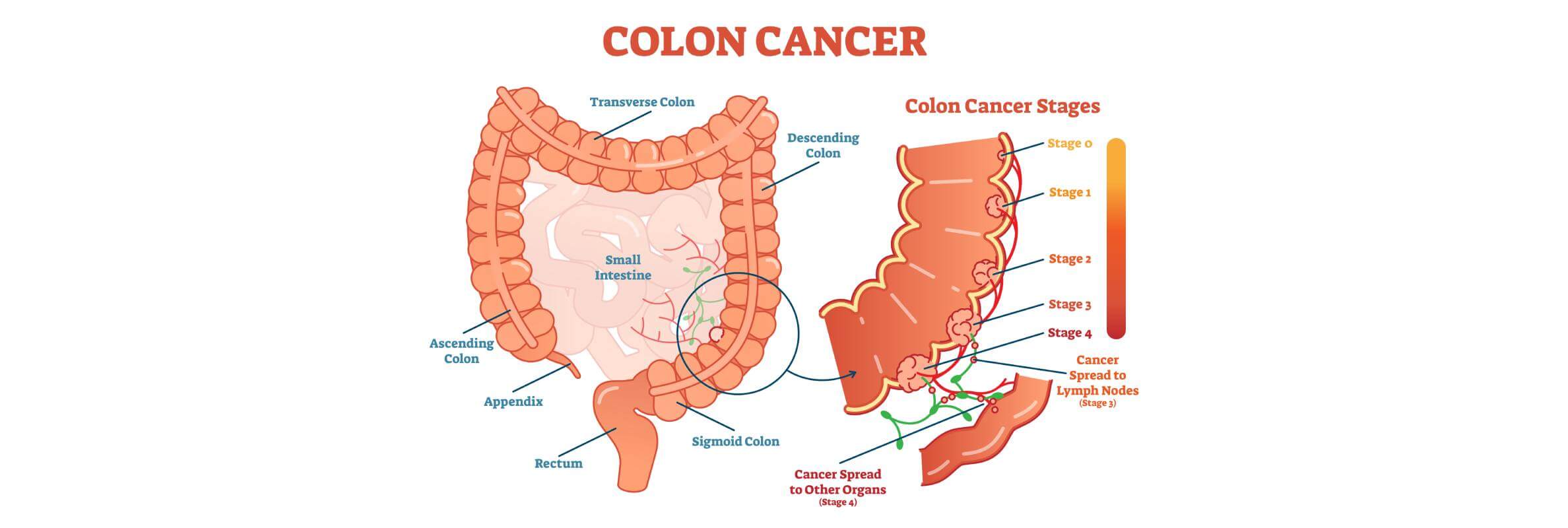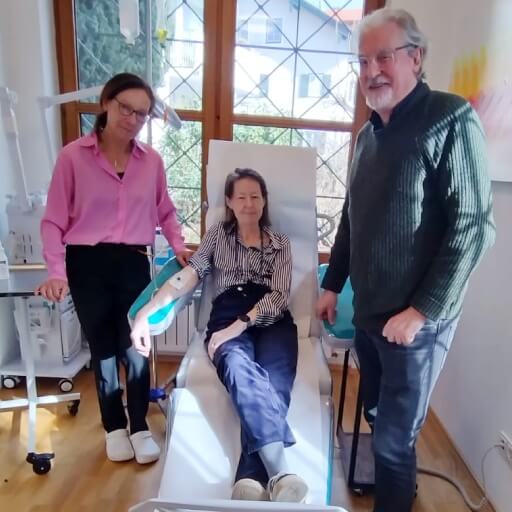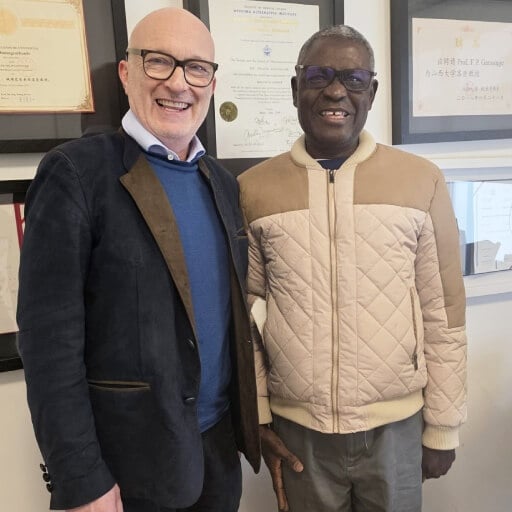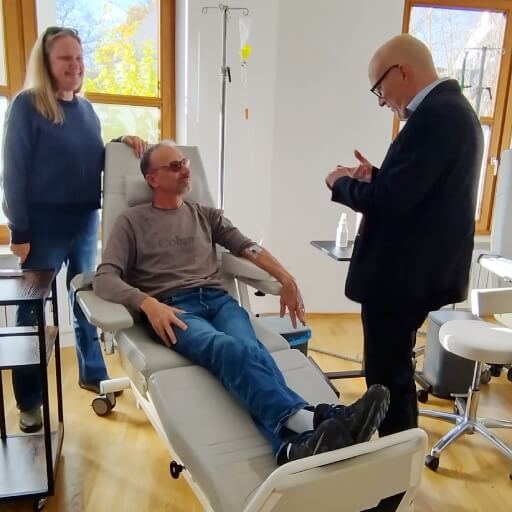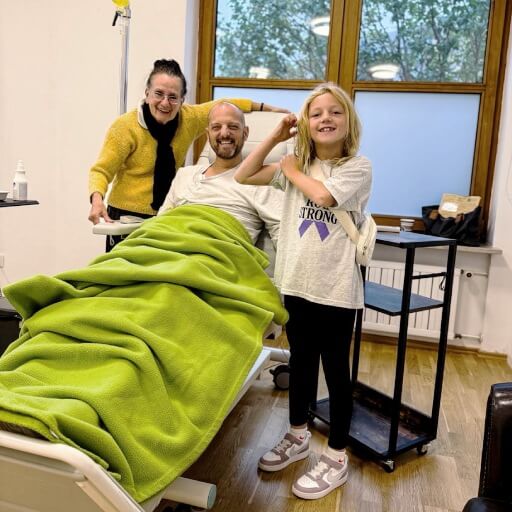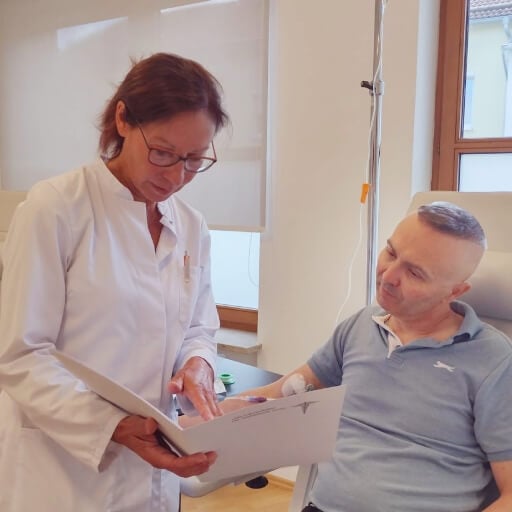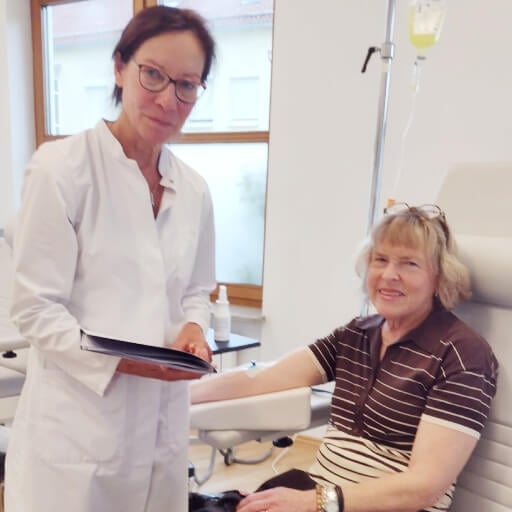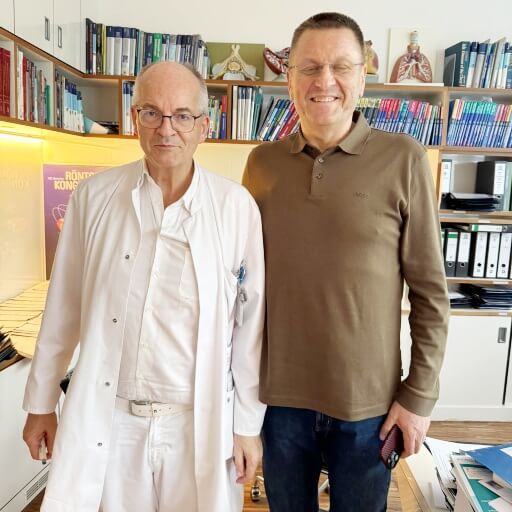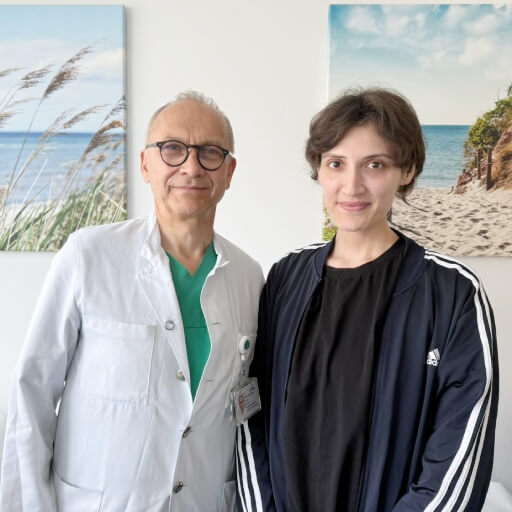Colon cancer stage 4 is a form of colorectal cancer in which the cancer has spread beyond the colon and metastasized. The most common sites of involvement are the liver, lungs, peritoneum, ovaries, or distant lymph nodes. It is at this stage that the disease is no longer localized and requires a systemic, comprehensive approach to treatment.
It is important to note that stage 4 colon cancer is the most common stage of colorectal cancer at diagnosis. This is due to the long asymptomatic course of the disease in the early stages and the late presentation of patients for medical care.
Germany is one of the leading destinations for the treatment of metastatic colorectal cancer due to the combination of modern oncology protocols, high-tech medicine and a multidisciplinary approach.
The modern approach allows us to consider colon cancer stage 4 not only as a palliative diagnosis, but in some cases – as a manageable chronic disease with the prospect of long-term remission [1].
Standard Treatment for Stage 4 Colon Cancer and Its Disadvantages
Colon cancer stage 4 is diagnosed when a patient presents with distant metastases and widespread dissemination of malignant cells. This advanced stage develops as cancer cells migrate through the circulatory system, lymphatic vessels, and abdominal tissues to establish secondary tumor sites beyond the primary colon location.
Conventional treatment typically combines chemotherapy with surgical tumor removal, though these standard approaches present several significant challenges:
- Chemotherapy for stage 4 bowel cancer usually involves an intravenous injection of anticancer drugs that allows active agents to penetrate the colon at low concentrations. At the same time, the drugs affect the healthy cells of the whole body, thereby causing severe side effects.
- Treatment regimens often require extended chemotherapeutic courses lasting months, creating both financial and quality-of-life burdens.
- Surgical interventions for stage 4 bowel cancer can only remove visible tumors, missing micrometastases, which may develop into new tumors.
- Evidence suggests these conventional approaches may have a limited impact on overall survival or quality of life in advanced stages.
Radiation therapy for colon cancer stage 4 plays a restricted role. It is usually indicated for pain management or targeted treatment of bone or brain metastases [2].
Despite progress, standard approaches have a number of limitations:
- Incomplete disease control in multiple metastases
- Development of resistance to chemo- and targeted therapy
- Toxicity and side effects
- Limited efficacy in peritoneal metastases
That is why even the best treatment for colon cancer stage 4 in Germany does not always allow achieving long-term remission using standard methods alone.
The limitations of classical approaches have given rise to the development of new treatment for colon cancer stage 4. Modern oncology seeks not only to prolong the lives of patients, but also to change the course of the disease where standard methods have already exhausted their potential.
Leading European medical centers have developed new treatment for colon cancer stage 4 that reduces toxicity while improving safety profiles. These facilities utilize minimally invasive techniques, including robot-assisted surgeries, HIPEC, PIPAC and breakthrough immunotherapy medications, which significantly minimize complication risks and substantially improve both recovery trajectories and long-term survival outcomes.
The Latest and the Most Effective Treatment of Colon Cancer Stage 4 in Germany
Best treatment for colon cancer stage 4 in Germany is based on a combination of standard and innovative methods used in highly specialized oncology centers. Colon cancer treatment in Germany is known for its personalized approach: an individual strategy is formed for each patient, taking into account the biology of the tumor and the prevalence of the disease. That is why stage 4 bowel cancer often requires access to methods that are not available in many countries.
At the same time, international patients increasingly pay attention to transparency and planning when considering treatment abroad. Understanding stage 4 colon cancer treatment costs in Germany allows patients and their families better evaluate available options and align medical decisions with financial expectations.
The choice of optimal colon cancer stage 4 treatment options is determined by:
- Localization and number of metastases
- Presence of peritoneal involvement
- Molecular genetic profile of the tumor
- General condition of the patient and previous treatment
Based on these data, the multidisciplinary team selects a new treatment for colon cancer stage 4 or a combination of several methods.
Advanced Surgical Techniques for Colon Cancer Stage 4 Treatment
Patients with stage 4 colon cancer can undergo cytoreductive surgeries. The doctor's task is to remove as much of the tumor tissue as possible. Best treatment for colon cancer stage 4 in Germany proposes high-power surgical microscopes to identify and extract even microscopic tumor foci that would otherwise remain invisible to the naked eye. The best results can be achieved by removing all visible areas of the tumor's spread.
After well-performed surgical procedures and additional drug therapy, many patients have a life expectancy of more than 10 years. These results are significantly better as compared to standard surgery [3].
Complete cytoreduction combined with targeted adjuvant therapies (HIPEC, PIPAC described in detail below) has shown remarkable survival outcomes. The new treatment for colon cancer stage 4 includes precise pre-surgical mapping, intraoperative fluorescence-guided imaging techniques, and customized post-surgical treatment protocols based on molecular tumor profiling. This comprehensive strategy addresses both primary and secondary cancer sites while preserving maximum organ function and quality of life.
Hyperthermic Intraperitoneal Chemotherapy for Colon Cancer Stage 4
Within modern colon cancer treatment in Germany, hyperthermic intraperitoneal chemotherapy (HIPEC) is increasingly used as a part of stage 4 colon cancer treatment options instead of conventional chemotherapy. For many international patients, HIPEC is regarded as one of the most promising affordable stage 4 colon cancer treatment in Germany, particularly for patients with peritoneal metastases.
This method is especially relevant in advanced disease because patients often ask fundamental questions such as "how fast does colon cancer spread to other organs?" or "how to cure colon cancer once metastases have occurred?" While stage 4 colon cancer cure in the absolute sense remains rare, HIPEC represents an important step toward long-term disease control and, in selected cases, meaningful improvement in stage 4 colon cancer.
The HIPEC procedure consists of flushing the abdominal cavity with a chemotherapy solution heated to 42-43 °C. This approach demonstrates strong clinical results because it provides several advantages at once. It allows the use of higher local concentrations of chemotherapeutic drugs, which is not possible with systemic therapy colon cancer protocols due to the risk of severe side effects. It shows the best results since such an approach provides several advantages at once:
- It is possible to use higher concentrations of drugs with localized introduction, which is unavailable with systemic chemotherapy because of the risk of complications.
- The high temperature of the solution enhances the effect on cancer cells and improves the penetration of drugs into tumor tissues.
- The drugs can remain in the colon for a long time and continue to act. However, they are not absorbed into the bloodstream and do not cause systemic side effects (such as nausea, abdominal pain, loose stools, etc.) [4].
Hyperthermal chemotherapy as part of stage 4 colon cancer treatment in Germany is performed in combination with the surgical removal of tumor foci in the abdominal cavity, thereby increasing the effectiveness of surgical interventions. It is because, even after the operation, there are no visible tumor foci at all, and the presence of previously undetected cancer cells cannot be completely excluded. As a result, the positive effect of such treatment is greatly increased. This combined approach significantly reduces the risk of cancer recurrence by up to 70-85% compared to surgery alone, making it a cornerstone option in specialized colon cancer stage 4 centers in Germany.
For patients and families evaluating outcomes and costs, transparency is also important. Many clinics provide detailed information on colon cancer stage 4 treatment prices in Germany, helping patients objectively compare treatment plans and understand the value of advanced therapies such as HIPEC within the broader context of bowel cancer cure-oriented strategies.
For an in-depth understanding of HIPEC treatment from a practical perspective, we interviewed Prof. Dr. med. Michael Lipp from the Department of General and Abdominal Surgery at Asklepios Hospital Barmbek Hamburg. As a leading expert who performs HIPEC procedures weekly and has treated numerous patients since 2015, Dr. Lipp shares crucial insights about patient selection, procedure specifics, recovery expectations, and the latest advances in this innovative treatment method. His firsthand experience helps patients and their families better understand what HIPEC is regarded as one of the best treatment for colon cancer stage 4 in Germany.
Dr. Michael Lipp on Precision Cancer Care: Transforming Treatment with HIPEC
Pressurized Intraperitoneal Aerosol Chemotherapy (PIPAC) for Colon Cancer Stage 4
Within the framework of stage 4 colon cancer treatment in Germany, the PIPAC method (Pressurized Intraperitoneal Aerosol Chemotherapy) is increasingly used – an innovative approach to the treatment of patients with peritoneal metastases. This method is considered an important part of affordable stage 4 colon cancer treatment in Germany and is a promising alternative or addition to more aggressive interventions.
The PIPAC procedure consists in the introduction of chemotherapeutic drugs in the form of an aerosol under pressure directly into the abdominal cavity during minimally invasive laparoscopy. This approach demonstrates high efficiency, as it combines several fundamental advantages at once, which makes it an example of a new treatment for colon cancer stage 4.
Firstly, due to the aerosol form and increased pressure, a uniform distribution of drugs is achieved over the entire surface of the peritoneum, including hard-to-reach areas. Secondly, the method allows the use of lower doses of chemotherapy than with systemic treatment, which significantly reduces the risk of toxic complications. Thirdly, the pressure promotes deeper penetration of drugs into tumor tissues, enhancing their effect on cancer cells.
It is important that with PIPAC, chemotherapy drugs almost do not enter the systemic bloodstream, so patients are much less likely to experience side effects such as nausea, weakness, diarrhea or severe abdominal pain [5]. This makes the method especially valuable for patients with advanced disease who have already received multi-course chemotherapy as part of bowel cancer treatment stage 4.
PIPAC can be performed repeatedly at certain intervals, which allows monitoring peritoneal carcinomatosis in dynamics and combining the method with systemic therapy. In many clinics in Germany, it is used as part of a combined strategy among colon cancer stage 4 treatment options, especially in cases where surgical treatment or HIPEC are not possible.
Due to its minimal invasiveness, good tolerability, and local effect on the tumor, PIPAC is today considered as one of the key elements of the best treatment for colon cancer stage 4 in Germany, aimed not only at prolonging life, but also at preserving its quality, even in advanced forms of the disease [2].
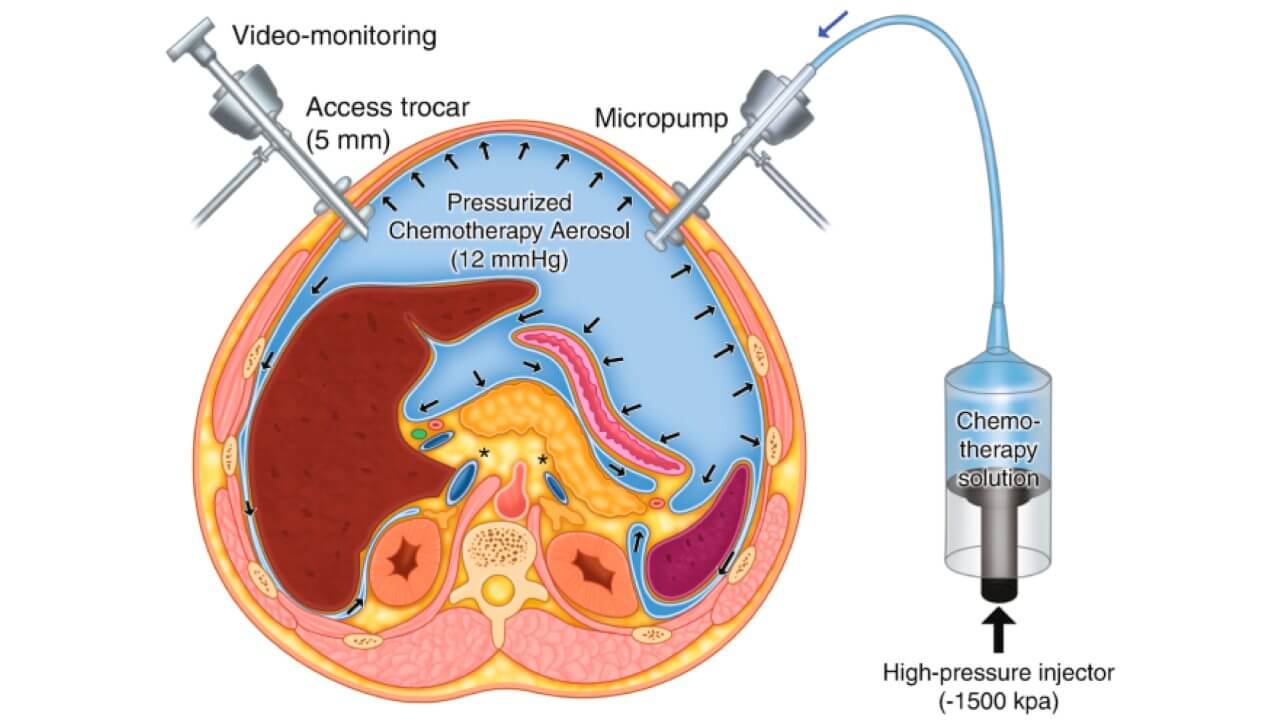
Immunotherapy for Stage 4 Colon Cancer
Immunotherapy is an important component of modern colon cancer stage 4 treatment options and increasingly used within colon cancer treatment in Germany. This approach involves the administration of drugs that block certain molecules on the surface of cancer cells. Such drugs do not affect the tumor, they prevent it from evading the immune response and help the body`s own immune system recognize and eliminate the disease. In the context of affordable stage 4 colon cancer treatment in Germany, immunotherapy is often considered when standard approaches reach their limits.
Immunotherapy for colon cancer stage 4 allows for achieving the following effects:
- Reducing tumor size and stopping its further development.
- Activating the immune system, which can reduce the number of metastases.
- Minimizing side effects. As a rule, the last ones are not severe and disappear a few days after therapy [6].
These outcomes are particularly relevant for patients who ask difficult but common questions such as: "can you beat stage 4 cancer?" or "when to stop chemo for colon cancer?", as immunotherapy may offer an alternative or complementary strategy when chemotherapy becomes ineffective or poorly tolerated.
Checkpoint inhibitors targeting specific PD-1 and CTLA-4 proteins are already used in clinical practice as a part of bowel cancer treatment in Germany for colon cancer stage 4 immunotherapy. These drugs are typically administered intravenously once every three weeks and are especially effective in selected patients with specific molecular tumor features.
Adoptive immunotherapy is another evolving strategy within best treatment for colon cancer stage 4 in Germany. The treatment consists in extracting immune cells from the patient's blood, activating them, cultivating them to increase their number, and injecting them into the body. If successful, activated lymphocytes attack the tumor and its metastases.
Dendritic Cells Therapy for Stage 4 Colon Cancer
Dendritic cell vaccines represent one of the most promising directions in new treatment for colon cancer stage 4 and are considered an important part of modern colorectal cancer treatment. This approach is actively used as part of stage 4 colon cancer treatment in Germany, especially for patients with metastatic colorectal cancer who require highly personalized care.
The significance of dendritic cells for immunology was acknowledged with the 2011 Nobel Prize in Medicine [7] – a testament to their fundamental role in understanding how the human immune system functions and fights disease. This personalized treatment for colon tumors uses the patient's own immune cells, which are modified to target cancer cells specifically. The vaccine can be manufactured using either liquid biopsy samples or tumor tissue fragments obtained during surgery. These biological materials provide the necessary tumor-specific antigens that are then used to "train" dendritic cells to recognize and fight cancer cells.
The process involves extracting immune cells from the patient's blood, processing them in a specialized laboratory to develop into dendritic cells, and then exposing them to the patient's tumor antigens. After about a week of cultivation, these activated dendritic cells are reintroduced into the patient's body as a vaccine. Once administered, these cells help stimulate the immune system to recognize and attack cancer cells throughout the body, including metastases. This makes dendritic cell therapy a valuable option within bowel cancer treatment stage 4, where systemic disease control is essential [10].
Studies have shown that dendritic cell vaccines can reduce recurrence rates by 65-85% in colon cancer stage 4 patients, particularly when combined with standard treatments. Moreover, this innovative immunotherapeutic approach has demonstrated the ability to improve 5-year survival rates by 40-60% compared to conventional therapies alone, offering new hope for patients with colon cancer stage 4 disease who previously had limited treatment options. These results are especially meaningful for patients concerned about stage 4 cancer prognosis, as they indicate that even advanced disease can remain stage 4 colon cancer treatable with modern strategies [8].
While patients often ask "can immunotherapy cure stage 4 cancer?", current evidence suggests that immunotherapy is more accurately described as the best treatment for colon cancer stage 4 in Germany and is considered a powerful tool for long-term disease control and survival extension rather than an absolute bowel cancer cure. The personalized nature of the vaccine allows for a targeted immune response that can continue to protect against cancer recurrence long after the initial treatment is completed.
Dendritic cell therapy is offered in highly specialized colon cancer stage 4 centers in Germany, often as part of integrated colon cancer stage 4 treatment options. These centers also access some of the colorectal cancer latest treatment approaches available today.
To explore the cutting-edge developments in immunotherapy, particularly dendritic cell treatment, we interviewed Prof. Dr. Frank Gansauge, a renowned expert with over 22 years of experience in dendritic cell immunotherapy. As one of the pioneers in this field since 2001, Dr. Gansauge shares valuable insights about the effectiveness of dendritic cell immunotherapy in affordable stage 4 colon cancer treatment in Germany, patient selection criteria, and the promising future of this innovative approach. His extensive experience and research helps patients better understand how immunotherapy fits into modern, personalized colon cancer stage 4 treatment options.
Leading Immunotherapy Expert Prof. Frank Gansauge: "Revolutionizing Cancer Treatment with Dendritic Cell Therapy"
TACE (Transarterial Chemoembolization) of Metastases in Colon Cancer Stage 4
TACE (transarterial chemoembolization) is an important part of modern colorectal cancer treatment and is widely used in Germany for patients with stage 4 bowel cancer. For this purpose, various chemical agents (emboli) are used. Within bowel cancer treatment in Germany, doctors prefer using microspheres – emboli, which are saturated with chemotherapy drugs (transarterial chemoembolization). In this case, the tumor can be eliminated not only due to the blockage of blood flow but also due to the prolonged influence of chemotherapeutic agents, which are released gradually from the microspheres over several weeks. This procedure is carried out using a catheter through a small incision in the groin.
Unlike simple vessel occlusion, TACE combines two therapeutic effects at once. First, the blood supply to the tumor is blocked, depriving cancer cells of oxygen and nutrients. Second, chemotherapeutic agents are gradually released from the microspheres over several weeks, providing prolonged local drug exposure [9]. As a result, colon tumor treatment becomes more targeted and effective, while systemic toxicity remains low.
Liver metastases develop in 85% of patients with stage 4 bowel cancer. They can be removed surgically only in 20% of patients. In the rest, doctors use other treatment methods. For the majority of patients, alternative colon cancer stage 4 treatment options are required. TACE allows doctors to reduce metastatic foci by several times. The damage to healthy liver parenchyma is minimal – cancer cells die, but the liver function is preserved.
Clinical data from top hospitals for stage 4 colon cancer in Germany shows that transarterial chemoembolization significantly improves survival rates in patients with unresectable liver metastases from colorectal cancer. Studies demonstrate a 40-55% improvement in median survival compared to standard systemic chemotherapy alone. For patients with limited liver involvement, this targeted approach can extend 3-year survival rates by up to 65%, particularly when integrated into a comprehensive treatment strategy, directly addressing common patient questions such as can you survive stage 4 colon cancer or how long can a stage 4 colon cancer live.
Although rectal cancer prognosis stage 4 and colon cancer outcomes depend on many factors, including tumor burden and overall health, TACE has become a key option for patients who are not candidates for surgery. When integrated into a comprehensive, personalized treatment plan, transarterial chemoembolization represents one of the most effective colon cancer stage 4 treatment options, offering meaningful disease control and extended survival even at advanced stages.
Four-Time Around the World with Metastatic Cancer: Prof. Kovács on Real Patient Outcomes
| Indications | Risks | 5-year survival improvement | |
|---|---|---|---|
| Surgery | Removable primary tumor. Limited and accessible metastatic sites (liver, lung). Good performance status, eligible for major surgery. | Surgical complications, bleeding, infection, prolonged recovery time. | less than 10% |
| Chemotherapy | Unresectable metastatic colon carcinoma. Adjuvant therapy after surgery. Not candidates for more targeted therapies. | Nausea, vomiting, hair loss, fatigue, immunosuppression, neuropathy, and potential organ damage. | less than 10% |
| Radiation Therapy | Symptomatic metastases (particularly bone and brain metastases). Treatment for pain control. Adjuvant therapy for certain sites of metastatic colon carcinoma. | Skin changes, fatigue, gastrointestinal issues, and potential long-term tissue damage. | less than 15% |
| HIPEC | Peritoneal metastases; typically performed in combination with cytoreductive surgery. Limited disease burden in the abdominal cavity. | Moderate (surgical complications, infection risk). | 45-50% |
| PIPAC | Peritoneal metastases. Alternative treatment for colon cancer stage 4 in Germany (less invasive than HIPEC). | Minimal systemic side effects (abdominal pain, nausea, temporary inflammation) | 35-45% |
| TACE | Unresectable liver metastases. Primary inoperable methods and metastases all types of malignant tumors. Predominantly liver-confined metastatic colon carcinoma. | Mild post-procedure discomfort, typically temporary. | 45-65% |
| Dendritic cell therapy | All disease stages. Advanced disease and failure of standard therapies. Minimal residual disease after primary treatment. Can be combined with other treatment modalities. | Minimal (flu-like symptoms). | 60-80% |
Colon Cancer Treatment Costs in Germany: Why is it Worth Treating in Germany
The healthcare system in Germany is recognized all over the world. Every year, the government allocates substantial funding for advanced training programs for physicians and medical staff, large-scale scientific research, and continuous modernization of hospital infrastructure. As a result, patients from around the world come to Germany to receive advanced colorectal cancer treatment, including care for metastatic colorectal cancer.
Germany is known for offering a wide range of colon cancer stage 4 treatment options, combining evidence-based therapies with the therapy approaches. Even in advanced disease, stage 4 colon cancer treatable strategies are available, focusing on disease control, survival extension, and quality of life.
One of the key reasons patients choose Germany is access to the best clinics for stage 4 colon cancer in Germany. When planning therapy, many international patients are interested not only in treatment effectiveness but also in transparency and predictability of expenses. Therefore, understanding the therapy of bowel cancer is an important part of the decision-making process. German clinics provide clear, structured treatment plans with detailed cost breakdowns, enabling patients to objectively evaluate expenses related to bowel cancer and compare them with options in other countries.
The specialists of the medical facilities monitor the quality of the services provided at all stages. In addition, due attention is paid to rehabilitation and the well-being of patients.
| Type of treatment | Cost in Germany | Cost in USA | Cost in GB | Cost in Australia |
|---|---|---|---|---|
| Surgery | €25,000 – €45,000 | €65,000 – €85,000 | €35,000 – €55,000 | €20,000 – €40,000 |
| Chemotherapy | €80,000 – €150,000 full course | €100,000 – €180,000 full course | €90,000 – €165,000 full course | €100,000 – €150,000 full course |
| Radiation therapy | €28,000 – €42,000 | €40,000 – €80,000 | €35,000 – €65,000 | €50,000 – €100,000 |
| HIPEC | €50,000 – €80,000 | €112,000 – €150,000 | €83,000 – €118,000 | €100,000 – €150,000 |
| PIPAC | €18,000 – €20,000 | €37,000 – €56,000 | €30,000 – €41,000 | €6,562 per hospitalization |
| TACE | €6,500 – €24,000 per session | €40,000 – €100,000 | €25,000 – €45,000 | €45,000 – €65,000 |
| Dendritic cell therapy | €20,000 – €38,000 | €100,000 – €150,000 | Not available | Not available |
The Best Hospitals for Treatment of 4 Stage Colon (Bowel) Cancer
Germany is widely recognized for providing some of the most advanced colon cancer stage 4 treatment options, including care for patients with metastatic colorectal cancer. Below are leading university hospitals offering comprehensive therapy of bowel cancer in Germany, where even advanced disease can be controlled with modern multidisciplinary and innovative treatment strategies.
The following hospitals specialize in comprehensive medical care and provide treatment of rectal cancer stage 4 in Germany:
- University Hospital Duesseldorf, Department of Gastroenterology, Hepatology, and Infectology. This department is part of the certified Center for the Treatment of Bowel Diseases and provides full-spectrum care, including complex treatment for colon tumors at advanced stages. All types of surgical interventions and systemic therapy are carried out here, which is essential for patients undergoing therapy of bowel cancer. In addition to cooperation with other departments of the university hospital, the department has 10 specialized outpatient clinics and closely collaborates with other hospital units to deliver personalized strategies, including new treatment for colon cancer stage 4.
- University Hospital of Ludwig-Maximilian University of Munich, Department of Gastroenterology and Hepatology. The department specializes in endoscopic methods, which play an important role in modern colon cancer stage 4 treatment options. Since 2016, the head physician of the department, Professor Julia Mayerle, has been a board member of the European Association of Gastroenterologists, Endoscopists and Nutritionists (EAGEN). These minimally invasive approaches are particularly valuable for patients with metastatic colorectal cancer who require symptom control or local tumor management.
- University Hospital Ulm, Department of Gastroenterology and Hepatology. The department is mentioned among the best German medical facilities for the treatment of bowel cancer according to the FOCUS magazine. It is a part of the Comprehensive Cancer Center Ulm (CCCU). The high success rates of the department's work are confirmed by the certificate of the German Cancer Society, the ISO 9001:2008 SGS certificate and other ones. The clinic offers integrated care for stage 4 bowel cancer, addressing both stage 4 bowel cancer prognosis and long-term disease control through evidence-based and innovative therapies.
- University Hospital Wuerzburg, Department of Gastroenterology, Hematology, Oncology, Hepatology, Infectology, Rheumatology, and Clinical Immunology. This multidisciplinary department provides classical, guideline-based therapies with proven efficacy, focused on new treatment for colon cancer stage 4. Active collaboration with the Interdisciplinary Cancer Center Mainfranken allows patients with stage 4 cancer prognosis colon to receive highly individualized care. The department also treats advanced rectal tumors, making it a strong option for treatment of rectal cancer stage 4 in Germany.
Why Do These Centers Matter?
These university hospitals represent the highest standard of best treatment for colon cancer stage 4 in Germany, offering patients access to advanced diagnostics and innovative therapies. Even in cases of stage 4 bowel cancer, treatment strategies in Germany focus not only on prognosis but also on extending survival and preserving quality of life.
A Medical Journey: Every Step of the Way With Booking Health
Finding the best treatment strategy for your clinical situation is a challenging task. Being already exhausted from multiple treatment sessions, having consulted numerous specialists, and having tried various therapeutic interventions, you may be lost in all the information given by the doctors. In such a situation, it is easy to choose a first-hand option or to follow standardized therapeutic protocols with a long list of adverse effects instead of selecting highly specialized innovative treatment options.
To make an informed choice and get a personalized cancer management plan, which will be tailored to your specific clinical situation, consult medical experts at Booking Health. Being at the forefront of offering the latest medical innovations for already 12 years, Booking Health possesses solid expertise in creating complex cancer management programs in each case. As a reputable company, Booking Health offers personalized stage 4 colon cancer treatment plans with direct clinic booking and full support at every stage, from organizational processes to assistance during treatment. We provide:
- Assessment and analysis of medical reports
- Development of the medical care program
- Selection of a suitable treatment location
- Preparation of medical documents and forwarding to a suitable clinic
- Preparatory consultations with clinicians for the development of medical care programs
- Expert advice during the hospital stay
- Follow-up care after the patient returns to their native country after completing the medical care program
- Taking care of formalities as part of the preparation for the medical care program
- Coordination and organization of the patient's stay in a foreign country
- Assistance with visas and tickets.
- A personal coordinator and interpreter with 24/7 support
- Transparent budgeting with no hidden costs
Health is an invaluable aspect of our lives. Delegating management of something so fragile yet precious should be done only to experts with proven experience and a reputation. Booking Health is a trustworthy partner who assists you on the way of pursuing stronger health and a better quality of life. Contact our medical consultant to learn more about the possibilities of personalized treatment with innovative methods for metastatic colon cancer with leading specialists in this field.
Modern Cancer Treatment: Patient Journeys with Booking Health
Frequently Asked Questions of Our Patients with Stage 4 Colon Cancer
Send request for treatmentStage 4 colon cancer treatment in Germany offers a variety of advanced treatment options for stage 4 colon cancer, including targeted therapies, immunotherapy, chemotherapy, and surgical interventions. Additionally, innovative treatments like HIPEC (hyperthermic intraperitoneal chemotherapy) expand colon cancer stage 4 treatment options, giving patients access to new and personalized strategies.
Yes, affordable stage 4 colon cancer treatment in Germany clinics often employs advanced surgical techniques such as minimally invasive laparoscopic surgery, robotic-assisted surgery, and cytoreductive surgery combined with HIPEC to remove metastases and improve outcomes.
Modern stage 4 colon cancer treatment in Germany includes dendritic cell vaccines, which show particularly promising results. Other colon cancer stage 4 treatment options include checkpoint inhibitors targeting PD-1 and CTLA-4 proteins, and adoptive cell therapy.
Supportive care is an essential component of bowel cancer treatment in Germany and includes palliative care services, pain management, nutritional support, psychological counseling, and rehabilitation programs. These services aim to improve the quality of life and manage symptoms and side effects of cancer treatment.
Patients may complain of abdominal pain, fatigue, blood in stool, and weight loss. Metastatic colon carcinoma may cause jaundice or breathing difficulties, depending on the tumor spread. Symptom control is a key goal of stage 4 colon cancer treatment in Germany.
The cost of affordable stage 4 colon cancer treatment in Germany depends on the selected methods. For example, chemoembolization costs are €6,500-€24,000, dendritic cell therapy – €20,000-€38,000. You will find more prices and their differences between hospitals on the Booking Health website.
Oncologists use HIPEC for peritoneal metastases, local tumor control. For liver metastases, chemoembolization – TACE – is performed. Patients with advanced or recurrent diseases are candidates for dendritic cell vaccines as part of stage 4 colon cancer treatment in Germany.
They are acceptable and manageable. Systemic toxicity of HIPEC – low relative to intravenous chemotherapy; chemoembolization – only light post-procedure discomfort; dendritic cell vaccines – safe, rarely cause complications. This is important for fragile cancer patients undergoing bowel cancer treatment in Germany.
Talking about particular methods, HIPEC increases 5-year survival up to 45-50%, chemoembolization up to 58%, and dendritic cell vaccines up to 80%. The Booking Health team helps patients navigate stage 4 colon cancer treatment in Germany and choose the most appropriate therapy based on their individual condition.
In Germany stage 4 colon cancer is treated using advanced approaches – interventional radiology, regional chemotherapy, HIPEC and dendritic cell immunotherapy. Here these methods are combined individually to control metastases and prolong survival.
Advanced care is provided at leading university hospitals including: University Hospital Duesseldorf, LMU Munich, University Hospital Ulm and University Hospital Wuerzburg.
In Germany patients benefit from access to innovative therapies which are often combined with standard methods to achieve the best possible result. This is why Germany is considered one of the best countries for stage 4 colon cancer treatment.
Choose treatment abroad and you will surely get the best results!
Authors:
This article was edited by medical experts, board-certified doctors Dr. Nadezhda Ivanisova, and Dr. Daria Sukhoruchenko. For the treatment of the conditions referred to in the article, you must consult a doctor; the information in the article is not intended for self-medication!
Our editorial policy, which details our commitment to accuracy and transparency, is available here. Click this link to review our policies.
Sources:
[1] V Väyrynen, E‐V Wirta, T Seppälä et al. Incidence and management of patients with colorectal cancer and synchronous and metachronous colorectal metastases: a population‐based study. BJS Open. 2020 Jun 16;4(4):685–692. doi: 10.1002/bjs5.50299. [DOI] [PMC free article]
[2] E Gabriela Chiorean, Govind Nandakumar, Temidayo Fadelu et al. Treatment of Patients With Late-Stage Colorectal Cancer: ASCO Resource-Stratified Guideline. JCO Glob Oncol. 2020 Mar 9;6:JGO.19.00367. doi: 10.1200/JGO.19.00367. [DOI] [PMC free article]
[3] Michele Pisano, Luigi Zorcolo, Cecilia Merli et al. 2017 WSES guidelines on colon and rectal cancer emergencies: obstruction and perforation. World J Emerg Surg. 2018 Aug 13;13:36. doi: 10.1186/s13017-018-0192-3. [DOI] [PMC free article]
[4] Julie J M Hamm, Rudolf van den Berg, Eleni-Rosalina Andrinopoulou et al. Adjuvant hyperthermic intraperitoneal chemotherapy in patients with colon cancer at high risk of peritoneal metastases: individual patient data meta-analysis. Br J Surg. 2025 Apr 29;112(4):znaf076. doi: 10.1093/bjs/znaf076. [DOI] [PMC free article]
[5] Martin Graversen, Sönke Detlefsen, Claus Fristrup et al. Adjuvant Pressurized IntraPeritoneal Aerosol Chemotherapy (PIPAC) in resected high-risk colon cancer patients – study protocol for the PIPAC-OPC3 Trial. A prospective, controlled phase 2 Study. Pleura Peritoneum. 2018 Jun 12;3(2):20180107. doi: 10.1515/pp-2018-0107. [DOI] [PMC free article]
[6] Aparna Kalyan, Sheetal Kircher, Hiral Shah, Mary Mulcahy, Al Benson. Updates on immunotherapy for colorectal cancer. J Gastrointest Oncol. 2018 Feb;9(1):160–169. doi: 10.21037/jgo.2018.01.17. [DOI] [PMC free article]
[7] Roman Volchenkov, Florian Sprater, Petra Vogelsang, Silke Appel. The 2011 Nobel Prize in physiology or medicine. Scand J Immunol. 2012 Jan;75(1):1-4. doi: 10.1111/j.1365-3083.2011.02663.x. [DOI] [PubMed]
[8] Amanda L Wooster, Lydia H Girgis, Hayley Brazeale et al. DENDRITIC CELL VACCINE THERAPY FOR COLORECTAL CANCER. Pharmacol Res. Author manuscript; available in PMC: 2022 Feb 1. Published in final edited form as: Pharmacol Res. 2020 Dec 28;164:105374. doi: 10.1016/j.phrs.2020.105374. [DOI] [PMC free article]
[9] Yen-Cheng Chen, Ching-Wen Huang, Ching-Chun Li et al. Efficacy of transarterial chemoembolization with drug-eluting beads combined with systemic chemotherapy and targeted therapy in colorectal cancer liver metastasis. World J Surg Oncol. 2023 Dec 1;21:378. doi: 10.1186/s12957-023-03253-w. [DOI] [PMC free article]
[10] Yunqing Xie, Lijie Huang, Luchuan Chen et al. Effect of dendritic cell-cytokine-induced killer cells in patients with advanced colorectal cancer combined with first-line treatment. World J Surg Oncol. 2017 Nov 28;15:209. doi: 10.1186/s12957-017-1278-1. [DOI] [PMC free article]
Read:
Comprehensive Guide to Colon Cancer Treatment: New and Standard Treatment Options for Bowel Cancer
Dendritic Cell Therapy for Colon Cancer Treatment in Germany
Article menu:
- Standard Treatment for Stage 4 Colon Cancer and Its Disadvantages
- The Latest and the Most Effective Treatment of Colon Cancer Stage 4 in Germany
- Colon Cancer Treatment Costs in Germany: Why is it Worth Treating in Germany
- The Best Hospitals for Treatment of 4 Stage Colon (Bowel) Cancer
- A Medical Journey: Every Step of the Way With Booking Health
- Frequently Asked Questions of Our Patients with Stage 4 Colon Cancer
Don't know where to start?
Contact Booking Health